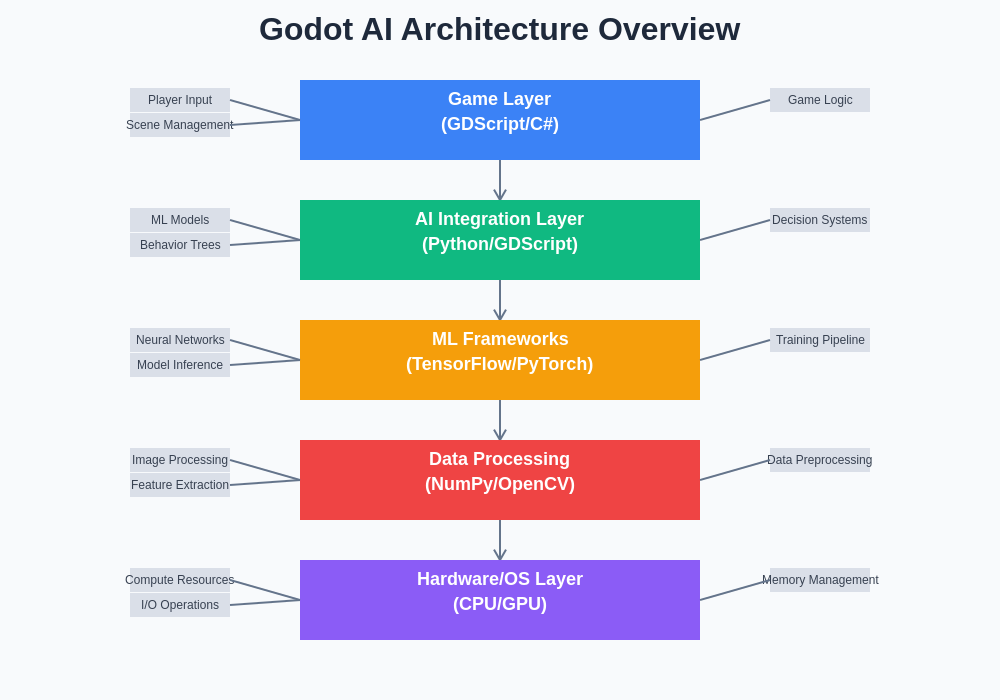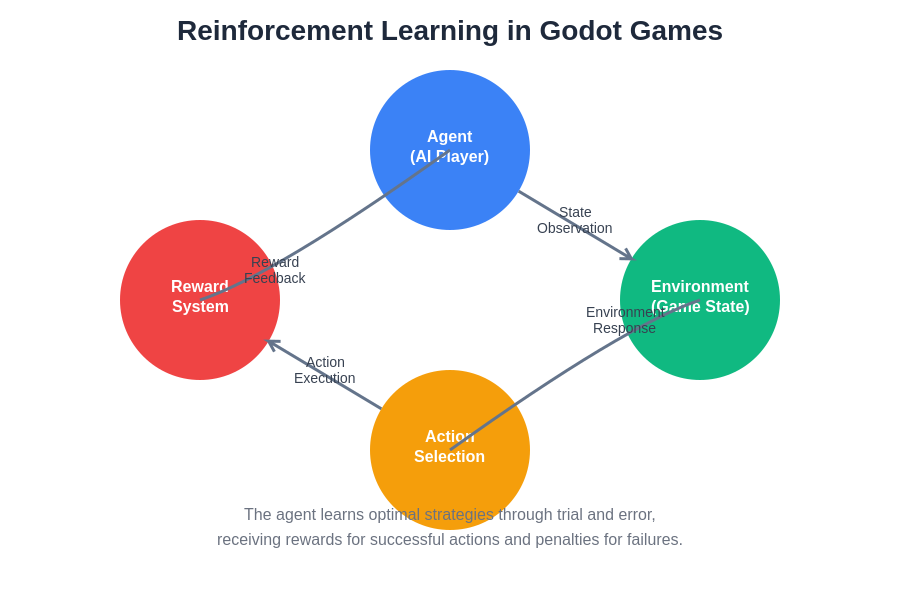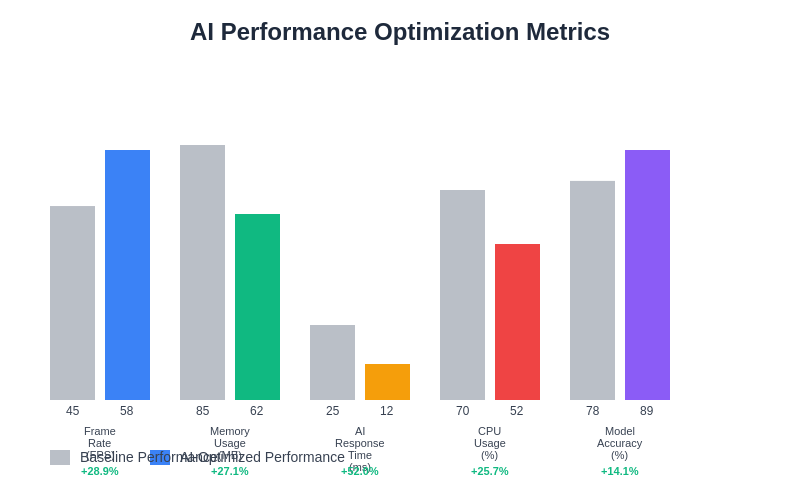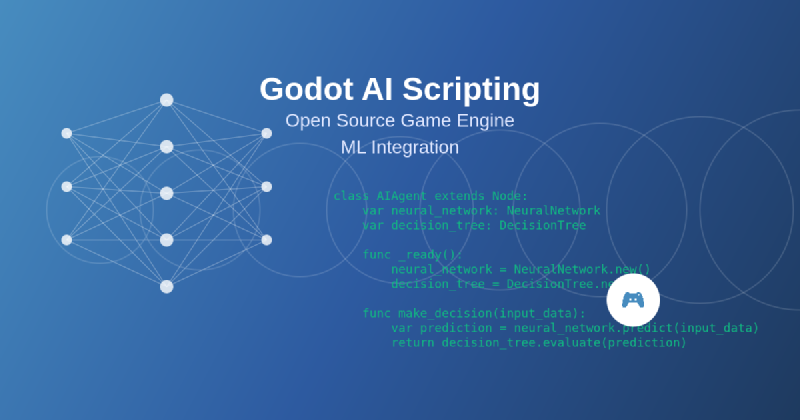The convergence of artificial intelligence and game development has reached a pivotal moment with the open-source Godot Engine emerging as a powerful platform for integrating sophisticated machine learning capabilities into interactive entertainment experiences. This revolutionary approach to game development transcends traditional scripting paradigms by empowering developers to create intelligent, adaptive, and responsive game mechanics that learn and evolve through player interaction, environmental changes, and dynamic gameplay scenarios.
Discover the latest AI trends in game development to understand how machine learning is reshaping the interactive entertainment industry and creating unprecedented opportunities for innovative gameplay experiences. The integration of AI scripting within Godot represents more than a technological advancement; it embodies a fundamental transformation in how developers conceptualize and implement intelligent behavior systems that enhance player engagement through personalized and adaptive gaming experiences.
The Evolution of AI in Open Source Game Development
Godot Engine has distinguished itself within the game development ecosystem by providing an accessible, flexible, and powerful framework for implementing artificial intelligence and machine learning solutions without the constraints and licensing costs associated with proprietary game engines. The engine’s commitment to open-source principles has fostered a vibrant community of developers who continuously contribute to expanding AI integration capabilities, creating comprehensive libraries, tools, and documentation that democratize access to advanced AI technologies for independent developers and small studios.
The architectural design of Godot facilitates seamless integration with external AI frameworks and libraries, enabling developers to leverage cutting-edge machine learning models, neural networks, and reinforcement learning algorithms directly within their game projects. This integration capability extends beyond simple AI behavior scripting to encompass complex decision-making systems, procedural content generation, dynamic difficulty adjustment, and intelligent non-player character behaviors that respond authentically to player actions and environmental stimuli.
Implementing Machine Learning with GDScript
GDScript, Godot’s native scripting language, provides an intuitive and powerful foundation for implementing AI behaviors and machine learning algorithms within game environments. The language’s Python-inspired syntax and tight integration with Godot’s scene system make it an ideal choice for developers seeking to implement intelligent behaviors without the complexity traditionally associated with AI programming. Through GDScript, developers can create sophisticated neural networks, implement genetic algorithms, and develop reinforcement learning systems that enable game entities to learn and adapt their behaviors based on accumulated experience and environmental feedback.
The implementation of machine learning algorithms in GDScript involves creating custom classes that encapsulate learning behaviors, decision-making processes, and adaptive responses to player actions. These implementations can range from simple state machines that evolve based on player preferences to complex deep learning networks that process visual information, audio cues, and gameplay patterns to generate intelligent responses and strategic decisions that enhance the overall gaming experience.

The modular architecture of Godot AI integration allows developers to implement machine learning components at various levels of game complexity, from individual character behaviors to comprehensive ecosystem simulations that respond dynamically to player interactions and environmental changes. This flexibility enables the creation of games that continuously evolve and adapt, providing unique experiences that reflect individual player preferences and playstyles.
Experience advanced AI development with Claude for comprehensive assistance in implementing complex machine learning algorithms and neural network architectures within your Godot projects. The combination of intelligent development assistance and open-source game engine capabilities creates an environment where innovative AI-driven game mechanics can flourish and evolve through iterative development and experimentation.
Python Integration for Advanced ML Frameworks
The integration of Python within Godot projects opens unprecedented possibilities for leveraging established machine learning frameworks such as TensorFlow, PyTorch, scikit-learn, and OpenAI Gym directly within game environments. This integration enables developers to utilize pre-trained models, implement transfer learning techniques, and access the vast ecosystem of Python-based AI libraries while maintaining the performance and real-time responsiveness required for interactive gaming experiences.
Python integration in Godot can be accomplished through several approaches, including the use of Godot’s Python scripting support, external process communication, and shared library implementations that bridge Python ML frameworks with GDScript game logic. These integration strategies allow developers to implement sophisticated AI behaviors such as computer vision for dynamic environment analysis, natural language processing for intelligent dialogue systems, and reinforcement learning for adaptive gameplay mechanics that respond to player behavior patterns and preferences.
The implementation process involves creating Python modules that handle machine learning computations and model inference while maintaining communication channels with GDScript controllers that manage game state, player interactions, and real-time rendering requirements. This architectural separation ensures that computationally intensive AI operations do not interfere with the game’s performance while enabling sophisticated AI behaviors that enhance gameplay depth and player engagement through intelligent and responsive game mechanics.
Neural Network Implementation for Game AI
The implementation of neural networks within Godot games represents a significant advancement in creating intelligent and adaptive game behaviors that transcend traditional rule-based AI systems. Neural networks enable the development of game entities that can learn complex patterns, make strategic decisions, and adapt their behaviors based on accumulated experience and environmental feedback. This capability is particularly valuable for creating non-player characters that exhibit realistic and unpredictable behaviors, dynamic difficulty adjustment systems that respond to player skill levels, and procedural content generation algorithms that create unique and engaging gameplay experiences.
The process of implementing neural networks in Godot involves designing network architectures that can process game state information, player actions, and environmental data to generate appropriate responses and decision-making outcomes. These networks can be trained using supervised learning techniques with pre-collected gameplay data, reinforcement learning approaches that enable agents to learn through trial and error within simulated environments, or transfer learning methods that leverage pre-trained models adapted for specific game contexts and requirements.
Neural network implementations in Godot can encompass various architectures including feedforward networks for pattern recognition and classification tasks, recurrent neural networks for sequential decision-making and temporal pattern analysis, convolutional neural networks for visual processing and computer vision applications, and generative adversarial networks for procedural content creation and dynamic asset generation that enhances gameplay variety and replayability.
Reinforcement Learning for Adaptive Gameplay
Reinforcement learning represents one of the most powerful and versatile AI techniques for creating adaptive and intelligent gameplay experiences within Godot games. This machine learning paradigm enables game entities to learn optimal behaviors through interaction with their environment, receiving rewards for successful actions and penalties for undesirable behaviors. The implementation of reinforcement learning in Godot creates opportunities for developing game mechanics that continuously evolve and improve, providing players with increasingly challenging and engaging experiences that adapt to individual skill levels and playing styles.
The reinforcement learning framework in Godot involves creating environments that define states, actions, and reward structures that guide the learning process toward desired behavioral outcomes. These environments can simulate various game scenarios including combat encounters, puzzle-solving challenges, resource management situations, and strategic decision-making contexts where AI agents learn to optimize their performance through repeated interaction and experience accumulation.
The implementation process requires careful design of reward functions that encourage desired behaviors while avoiding exploitation of unintended loopholes or suboptimal strategies. Successful reinforcement learning implementations in Godot result in AI agents that demonstrate increasingly sophisticated behaviors, strategic thinking, and adaptive responses that provide players with compelling and unpredictable gaming experiences that remain engaging over extended play sessions.

The reinforcement learning cycle in Godot games creates a continuous feedback loop where AI agents observe their environment, select actions based on learned policies, receive rewards or penalties for their choices, and update their decision-making strategies accordingly. This iterative process enables the development of increasingly sophisticated AI behaviors that adapt to player strategies and environmental changes.
Computer Vision and Image Processing
The integration of computer vision and image processing capabilities within Godot games opens exciting possibilities for creating interactive experiences that respond to visual input, environmental changes, and player actions through intelligent analysis of visual information. Computer vision implementation in Godot can encompass various applications including object recognition for dynamic environment interaction, facial recognition for personalized gaming experiences, gesture recognition for intuitive control schemes, and real-time image analysis for adaptive visual effects and dynamic content generation.
The implementation of computer vision in Godot typically involves integrating OpenCV libraries or other image processing frameworks through Python integration or custom GDNative modules that provide access to advanced visual analysis algorithms. These implementations enable games to process camera input, analyze screenshots, detect patterns within game environments, and generate intelligent responses based on visual information that enhances gameplay depth and interactivity.
Computer vision applications in Godot can include augmented reality features that overlay digital content onto real-world environments, procedural animation systems that respond to environmental visual cues, dynamic lighting and shading algorithms that adapt to scene composition, and intelligent camera systems that automatically frame action sequences and optimize visual presentation based on gameplay context and player preferences.
Enhance your research capabilities with Perplexity to access comprehensive information about computer vision algorithms, image processing techniques, and machine learning frameworks that can be integrated into your Godot AI projects for creating innovative and visually intelligent gaming experiences.
Natural Language Processing for Interactive Dialogue
Natural language processing integration within Godot games enables the creation of sophisticated dialogue systems, interactive storytelling experiences, and intelligent communication interfaces that respond naturally to player input and generate contextually appropriate responses. NLP implementation in Godot can encompass various applications including dynamic dialogue generation, sentiment analysis for adaptive narrative branching, language translation for global accessibility, and voice recognition for hands-free game interaction and control.
The implementation of natural language processing in Godot involves integrating established NLP libraries such as NLTK, spaCy, or Transformers through Python integration or API-based communication with cloud-based language processing services. These integrations enable games to understand player text input, generate coherent and contextually relevant responses, analyze emotional content for adaptive storytelling, and create personalized narrative experiences that reflect individual player preferences and interaction patterns.
Natural language processing applications in Godot can include intelligent quest systems that generate dynamic objectives based on player conversation choices, adaptive tutorial systems that explain game mechanics using natural language tailored to individual learning styles, and immersive role-playing experiences where non-player characters engage in meaningful conversations that influence story progression and character development through sophisticated language understanding and generation capabilities.
Procedural Content Generation with AI
Artificial intelligence-driven procedural content generation represents a transformative approach to creating dynamic, varied, and engaging game content that adapts to player preferences and gameplay patterns. AI-powered procedural generation in Godot can encompass various aspects of game development including level design, character creation, narrative generation, audio composition, and visual asset creation that provides virtually unlimited content variety while maintaining coherence and quality standards that enhance player engagement and replayability.
The implementation of AI-driven procedural generation involves training machine learning models on existing content examples to learn patterns, styles, and design principles that guide the generation of new content that maintains consistency with established artistic and gameplay standards. These implementations can utilize generative adversarial networks for visual asset creation, recurrent neural networks for narrative and dialogue generation, genetic algorithms for level design optimization, and evolutionary computation for balancing gameplay mechanics and difficulty progression.
Procedural content generation in Godot can create dynamic environments that respond to player actions and preferences, generate unique character designs and abilities that reflect player choices and progression, create adaptive musical compositions that respond to gameplay intensity and emotional context, and develop personalized quest lines and narrative content that reflect individual player interests and decision-making patterns through sophisticated content creation algorithms.
Performance Optimization for Real-Time AI
The implementation of artificial intelligence and machine learning capabilities within real-time gaming environments requires careful attention to performance optimization and computational efficiency to ensure smooth gameplay experiences while maintaining sophisticated AI behaviors. Performance optimization for AI in Godot involves various strategies including algorithm optimization, computational load distribution, memory management, and efficient data structures that minimize processing overhead while maximizing AI sophistication and responsiveness.
Optimization strategies for Godot AI implementations include using multithreading approaches that distribute AI computations across multiple processor cores, implementing efficient caching mechanisms that reduce redundant calculations, utilizing approximation algorithms that maintain acceptable accuracy while reducing computational complexity, and employing temporal optimization techniques that spread computationally intensive operations across multiple game frames to prevent performance bottlenecks.
The optimization process also involves profiling AI performance to identify computational bottlenecks, implementing efficient data serialization and communication protocols for AI components, utilizing hardware acceleration when available for machine learning operations, and designing AI architectures that gracefully degrade performance under resource constraints while maintaining essential functionality and acceptable user experience quality.

Performance optimization strategies for Godot AI implementations demonstrate significant improvements across multiple key metrics including frame rate stability, memory efficiency, AI response times, CPU utilization, and model accuracy. These optimizations ensure that sophisticated AI behaviors enhance gameplay experiences without compromising system performance or player satisfaction.
Integration with External AI Services
The integration of external AI services and cloud-based machine learning platforms within Godot games provides access to powerful AI capabilities that would be impractical to implement locally while enabling games to leverage cutting-edge AI technologies and continuously updated models. External service integration can include cloud-based machine learning APIs, natural language processing services, computer vision platforms, and specialized AI tools that enhance game functionality while maintaining performance and responsiveness requirements.
The implementation of external AI service integration involves designing robust communication protocols that handle network latency, service availability, and data security considerations while maintaining seamless gameplay experiences. These integrations can utilize RESTful API communication, WebSocket connections for real-time data exchange, and asynchronous processing patterns that prevent network operations from interfering with game performance and player experience quality.
External AI service integration in Godot can enable access to advanced capabilities such as real-time language translation for global multiplayer experiences, sophisticated image recognition for user-generated content analysis, advanced natural language understanding for complex dialogue systems, and cloud-based machine learning inference for computationally intensive AI operations that exceed local hardware capabilities while maintaining acceptable response times and user experience standards.
Security and Privacy Considerations
The implementation of AI and machine learning capabilities within Godot games requires careful consideration of security and privacy implications, particularly when handling player data, implementing cloud-based AI services, or utilizing user-generated content for machine learning training purposes. Security considerations encompass data encryption, secure communication protocols, user consent management, and privacy-preserving machine learning techniques that protect player information while enabling intelligent game features.
Privacy-preserving AI implementation in Godot can utilize techniques such as federated learning that enables model training without centralizing sensitive player data, differential privacy approaches that add carefully calibrated noise to protect individual player information, and on-device processing strategies that minimize data transmission while maintaining AI functionality. These approaches ensure that intelligent game features enhance player experiences without compromising personal privacy or data security.
Security implementations for Godot AI systems include input validation and sanitization for AI-processed data, secure model storage and transmission protocols, authentication and authorization mechanisms for AI service access, and monitoring systems that detect and respond to potential security threats or privacy violations that could compromise player trust and system integrity.
Community Resources and Development Ecosystem
The Godot AI development ecosystem encompasses a vibrant community of developers, researchers, and contributors who continuously expand the capabilities and resources available for implementing artificial intelligence and machine learning within game projects. This community-driven development approach has resulted in comprehensive documentation, tutorials, code examples, and collaborative projects that accelerate AI integration and reduce the barriers to implementing sophisticated AI features in Godot games.
Community resources for Godot AI development include specialized plugins and extensions that simplify AI implementation, comprehensive tutorials that guide developers through complex AI integration processes, collaborative research projects that explore innovative AI applications in gaming, and forums and communication channels that facilitate knowledge sharing and collaborative problem-solving among developers working on AI-enhanced game projects.
The ecosystem also encompasses academic partnerships, industry collaborations, and open-source initiatives that contribute to advancing AI capabilities in game development while maintaining the accessibility and community-driven principles that define the Godot development philosophy. These collaborative efforts ensure that cutting-edge AI technologies remain accessible to independent developers and small studios while fostering innovation and experimentation in AI-driven game design and development.
Future Directions and Emerging Technologies
The future of AI integration in Godot game development encompasses emerging technologies and research directions that promise to further enhance the capabilities and accessibility of artificial intelligence in interactive entertainment. These developments include advances in edge computing that enable more sophisticated on-device AI processing, improvements in machine learning efficiency that reduce computational requirements, and novel AI architectures that provide enhanced capabilities for game-specific applications and requirements.
Emerging technologies relevant to Godot AI development include neuromorphic computing architectures that mimic biological neural processing for improved efficiency, quantum machine learning algorithms that leverage quantum computing principles for enhanced problem-solving capabilities, and advanced transfer learning techniques that enable rapid adaptation of AI models for specific game contexts and requirements without extensive retraining processes.
The continued evolution of AI integration in Godot will likely encompass improved developer tools and visual scripting interfaces that simplify AI implementation, enhanced integration with emerging AI frameworks and platforms, standardized protocols for AI component interoperability, and collaborative development environments that facilitate AI research and experimentation within the game development community while maintaining the open-source principles and accessibility that define the Godot development philosophy.
Disclaimer
This article is for informational purposes only and does not constitute professional advice. The views expressed are based on current understanding of AI technologies and their applications in game development using Godot Engine. Readers should conduct their own research and consider their specific requirements when implementing AI-powered game features. The effectiveness of AI integration may vary depending on specific use cases, project requirements, hardware capabilities, and individual expertise levels. Always ensure compliance with relevant privacy regulations and security best practices when implementing AI features that process user data.
